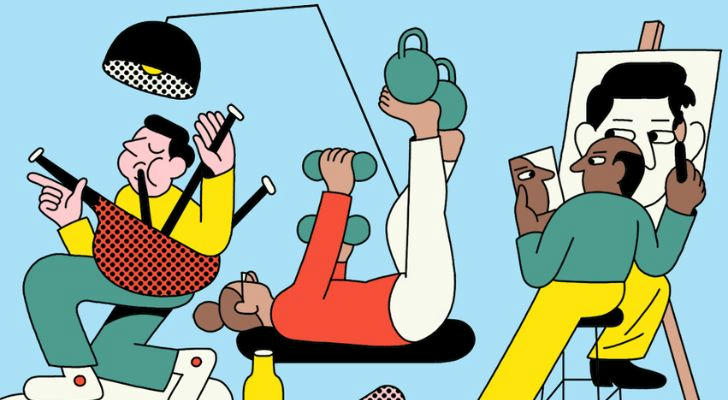The Importance Of Hobbies: A Scientific Overview

Hobbies are more than just a way to pass the time—they are essential to our mental well-being, physical health, and personal growth. Engaging in hobbies regularly can boost happiness, reduce stress, and enhance cognitive function. This article explores the science behind hobbies, their benefits for different age groups, and practical advice for discovering and maintaining hobbies.
Why Hobbies Matter
Mental and Emotional Health Benefits
Hobbies play a significant role in reducing stress and anxiety. Engaging in activities that bring us joy triggers the release of dopamine, a neurotransmitter associated with pleasure and motivation. According to the American Psychological Association, individuals who engage in regular hobbies experience 30% lower anxiety compared to those who don't. Creative hobbies like painting or playing music can also improve mood and reduce symptoms of depression, contributing to overall happiness.
Cognitive Function and Creativity
Participating in mentally stimulating hobbies—such as learning a new language or playing an instrument—can enhance cognitive abilities. A study by Cambridge University found that acquiring a new skill, even later in life, improves memory, attention, and slows cognitive decline. Hobbies that challenge the brain, such as chess or coding, can keep the mind sharp and improve problem-solving abilities.
Physical Health and Well-being
Engaging in physical hobbies, like running or yoga, has well-documented health benefits. The Mayo Clinic recommends at least 150 minutes of moderate exercise per week, which can reduce the risk of chronic diseases like heart disease and diabetes by 35%. Hobbies focused on physical activity improve cardiovascular health, boost energy levels, and enhance flexibility, making them an effective way to stay fit and healthy.
Career and Economic Value
Some hobbies can even turn into career opportunities. Photography, writing, and web design are all hobbies that have become full-time careers for many people. According to a LinkedIn survey, 61% of employers prefer candidates with creative hobbies because they often bring unique perspectives, creativity, and problem-solving skills to the workplace.

How Hobbies Benefit Different Age Groups
Ages 18-25: Exploration and Career Building
Young adults are in a unique position to explore a wide range of hobbies. This age is ideal for experimenting with activities that could evolve into career skills, such as graphic design, coding, or video production. Hobbies can also help build social connections and a sense of community, which are important for personal and professional growth.
Ages 26-40: Balancing Hobbies and Responsibilities
In this age group, individuals are often balancing work and family life, so hobbies should be a source of relaxation and personal fulfillment. Hobbies like fitness, cooking, or photography can help reduce stress while offering a creative outlet. These activities provide a sense of accomplishment, which is essential for maintaining a work-life balance.
Ages 41-55: Rediscovering Passions
For many people in their 40s and 50s, this is a time to rediscover hobbies they may have neglected earlier in life. Activities like gardening, travel, or painting not only provide relaxation but also promote creativity and personal expression. Hobbies in this stage of life can offer a sense of purpose and fulfillment.
Ages 56 and Above: Enriching Retirement
In retirement, hobbies can play an essential role in maintaining cognitive health and social engagement. Learning a new language, taking up a musical instrument, or volunteering can keep the brain active and help retirees build new social circles. Hobbies provide a meaningful way to spend time and stay mentally and physically healthy in later years.

How to Find the Right Hobby for You
Reflect on past interests – Think about hobbies you enjoyed as a child or in your younger years. Reconnecting with these interests can be a fulfilling experience.
Experiment with different activities – Try out various hobbies through online courses or local clubs to see which ones resonate with you.
Set achievable goals – If you enjoy writing, aim to complete one short story a week. If you like fitness, set a goal to run a certain distance each month.
Join a community – Being part of a group or an online forum related to your hobby can boost motivation and provide valuable support.
Commit to regular practice – Studies show that it takes 21 days to form a habit, so stick with your hobby long enough to see the benefits.
Real-Life Examples of Hobby Success
Turning a Hobby into a Career
Li Ming, 30, started as a casual photographer, taking landscape pictures with his phone and sharing them on social media. Over time, his interest grew, and he enrolled in online photography courses. After two years of practice, he secured commercial gigs and transitioned to a full-time photographer. His story demonstrates how a hobby can evolve into a rewarding career.

Improving Health Through Running
Wang Qiang, 45, had a sedentary job and began experiencing health issues. At a friend's suggestion, he started jogging three times a week. Six months later, he lost 10 kilograms, improved his blood pressure, and joined a running group. He eventually completed his first half-marathon, proving that hobbies can not only improve health but also bring new challenges and accomplishments.
Tips for Maintaining a Hobby
Create a schedule – Dedicate a specific time each week to your hobby, whether it’s painting on Sundays or practicing guitar on Fridays.
Find a hobby partner – Engaging in a hobby with a friend or group increases accountability and makes the activity more enjoyable.
Set challenges – Push yourself to master new skills or take on more difficult tasks, like learning a new technique or completing a challenging project.
Track your progress – Use a journal, photos, or social media to track improvements and stay motivated.
Enjoy the process – Focus on the joy of learning and growing rather than perfection. Remember, hobbies are meant to be fun, not stressful.
Conclusion
Hobbies provide significant benefits to our mental health, physical well-being, and personal development. From young adults exploring career-building skills to retirees finding purpose in their daily lives, hobbies enrich our experiences and help us grow. By experimenting, setting goals, and committing to regular practice, anyone can find a fulfilling hobby that brings joy and long-term benefits.
